Warfare is jarring. It is a wholly visceral and heart-pounding experience that may cause you to hold your breath for its entirety. Directors Ray Mendoza and Alex Garland have expertly crafted a gut-wrenching and intimate look at war's harrowing horrors with some of the best sound design and editing you can experience in a theater. It is a tightly wound firefight that lacks the character depth that could have put this one over the edge but will leave you vibrating in your seat after it's over and asking what it was all worth by the end.
Warfare is based on director Ray Mendoza's real experiences as a Navy SEAL during the Iraq War. As the opening says, it's based solely on the memories of those there. The film follows a platoon of Navy Seals during the Battle of Ramdi in 2006. We get up close and personal with the combat that ensues.
The MAJOR highlight of Warfare is its authenticity. It is a film made to be seen on the biggest screen as you are immersed entirely in the fray. It's the sound editing, not just the loudness or authenticity of the gunshots and explosions, and your ears ringing from jets flying overhead. During combat, we will communicate over-ear pieces sliced together with dialogue between soldiers in agonizing pain. At the same time, we feel the gravity and weight of reality drop on the faces of these soldiers masterfully as sound leaves them completely. The authenticity of the tactics and period are seen loud and clear on screen, and Mendoza's passion to nail that aspect of the film is felt. You combine that with Garland's expert directing where these insane and kinetic gun fights occur. Just completely locked the fuck in once the first grenade is thrown. You are never confused in your mind's eye where you are situated in this small town or inside these walls. Thanks to the excellent camerawork and sound design, you clearly understand the chaos around you.
The cast is filled with a stunning array of up-and-coming handsome men! Warfare plays right into making them look just like kids on screen, and when the situation becomes intense, you can see this crew of highly trained men lose their cool even with all the training; there's nothing like when the bullets start flying overhead. The cast includes Will Poulter, Charles Melton, Jospeph Quinn, Cosmo Jarvis, D'Pharaoh Woon-A-Tai, Kit Connor, and many more. The film does an excellent job of building subtle character traits for the cast. One of my favorite parts of the film is the time between or before combat erupts. The hurry-up-and-wait aspect of the military is on display here, and seeing how they all try to keep cool and entertain themselves just waiting for the onslaught to begin is wildly entertaining and tense. The way the cast executes military operations with stunning pace and accuracy while handling firearms violently is something out of my favorite movie, Heat (1995), that I love to see. Kilmer would have been proud of the gunfights here.
The problems with Warfare are twofold: There isn't a lot of character development or depth in the platoon. We spend time with subtle and funny interactions here and there, but for the most part, we don't know this crew. That's the directors' intent: these are just grunts, and these young men are just cogs in the war machine who were never given the time of day anyway. I can understand the intention, but it won't leave me with lasting impressions on the cast. My second issue is that the combat is visceral and intense but can feel repetitive. There is a sameness to it all as we spend most of the movie in one building, and people will remember the experience of Warfare more than individual scenes.
The lingering question of Warfare's politics and how they handle their subject matter needs to be addressed, but maybe the bigger question is whether there is such a thing as an "anti-war film." Much has been written and plenty of discourse over the notion that there is no such thing as an anti-war film. Displaying war violence on screen could easily be misinterpreted as heroic or used as propaganda for recruiting purposes. As I can understand that claim, I disagree entirely. There are plenty of anti-war films, such as Full Metal Jacket, Come and See, and The Thin Red Line, where the directors intend to show war as awful and destructive to the youth. It is not the fault of the director to put out an entertaining piece of film that's also anti-war and then be bastardized for it. They can't control people's media literacy or how the military will manipulate and prey on the youth using their work. You can still love R. Lee Ermey's portrayal as the charismatic and insane Marine Corps drill instructor with his wild one-liners and understand that he's the abusive bad guy here. It's okay to be pumped up by anti-war songs like Fortunate Son by Creedence Clearwater Revival or For What It's Worth by Buffalo Springfield, which are used in Vietnam films. Entertainment does not equal endorsement.
Warfare has caught a lot of shit online as another film justifying American war crimes in another country. Is it just more American propaganda? The comedian Frankie Boyle's iconic line, "American foreign policy is horrendous 'cause not only will America come to your country and kill all your people, but what's worse, I think, is that they'll come back 20 years later and make a movie about how killing your people made their soldiers feel sad." which again he is not wrong. The US invaded Iraq, killed over a million people, and disenfranchised millions more based on the lies and greed of men in office who claimed there were weapons of mass destruction when there were none. With countless war crimes committed, I can understand why placing the protagonists of a film as young, handsome American soldiers would push people off.
I did not come away from Warfare thinking that Mendoza, Garland, and Company were trying to glorify anything that happened in the film. There are some shocking, gorey moments in Warfare, and you see the psychological terrors that impact our Navy Seals. We see Iraqi families fearful for their lives and see the carnage they are subjected to by the US military being in their very homes. We see the aftermath and what we leave for other countries to pick the pieces up after we've left them in the wreckage. I did not leave Warfare being like wow that looks fucking awesome; sign me up. I am fine if you don't want to see this film because of the damage that was and continues to be done by the US actions, but I say that the film's subtle way of handling this matter, I think, is done finely.
Warfare will be wildly divisive, and that's also fair. I still have issues with Civil War, where every time Garland reached for something interesting, he would pull his punches. If you combined Warfare and Civil War, you'd have an absolute masterpiece somewhere, but as it stands, Warfare is a stunning technical achievement in sound. It's a personal insight into the horrors and what it means to survive in a place that does not want you. What toll does that have on the people you are invading? I've rambled on enough. This stupid lefty highly encourages people to see this on the biggest and loudest screen they can.
Final Score: 8/10
Written by Kevin J. Pettit

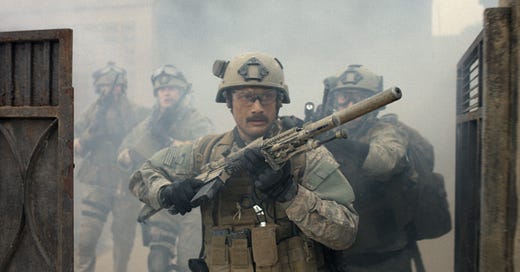



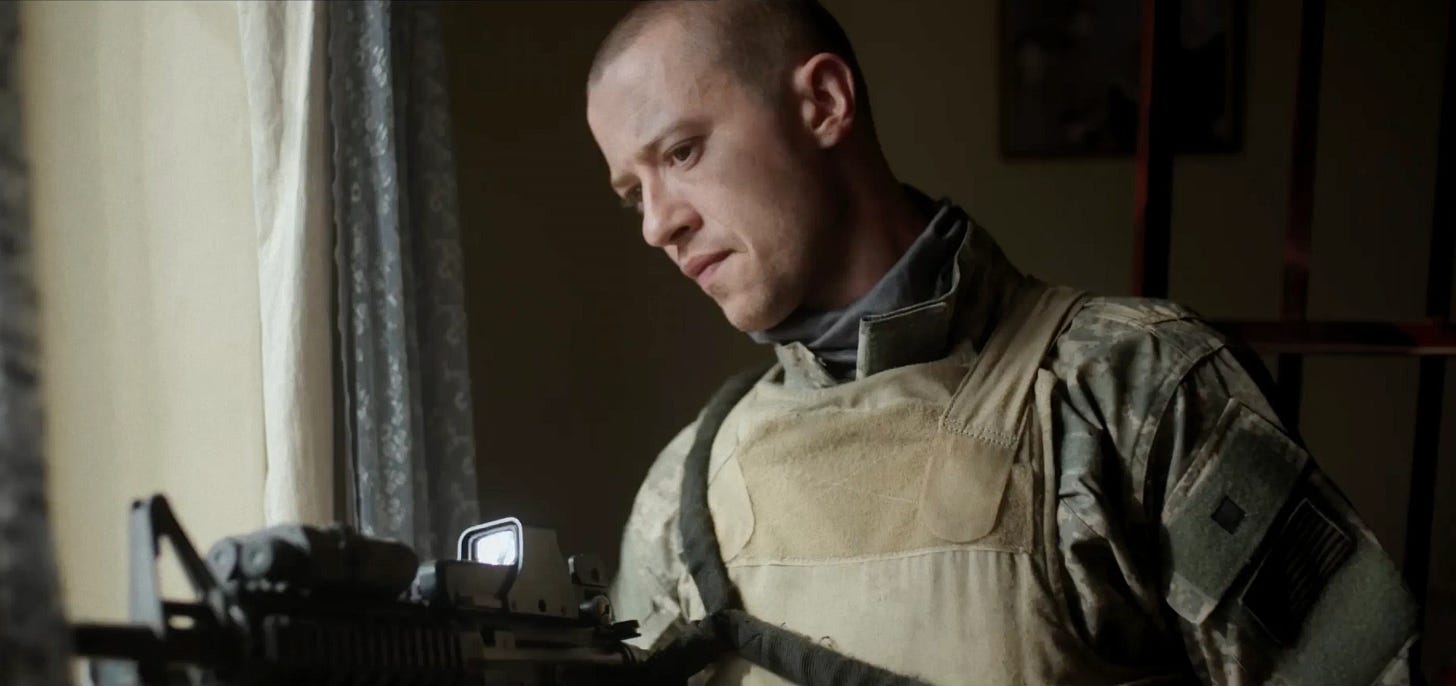
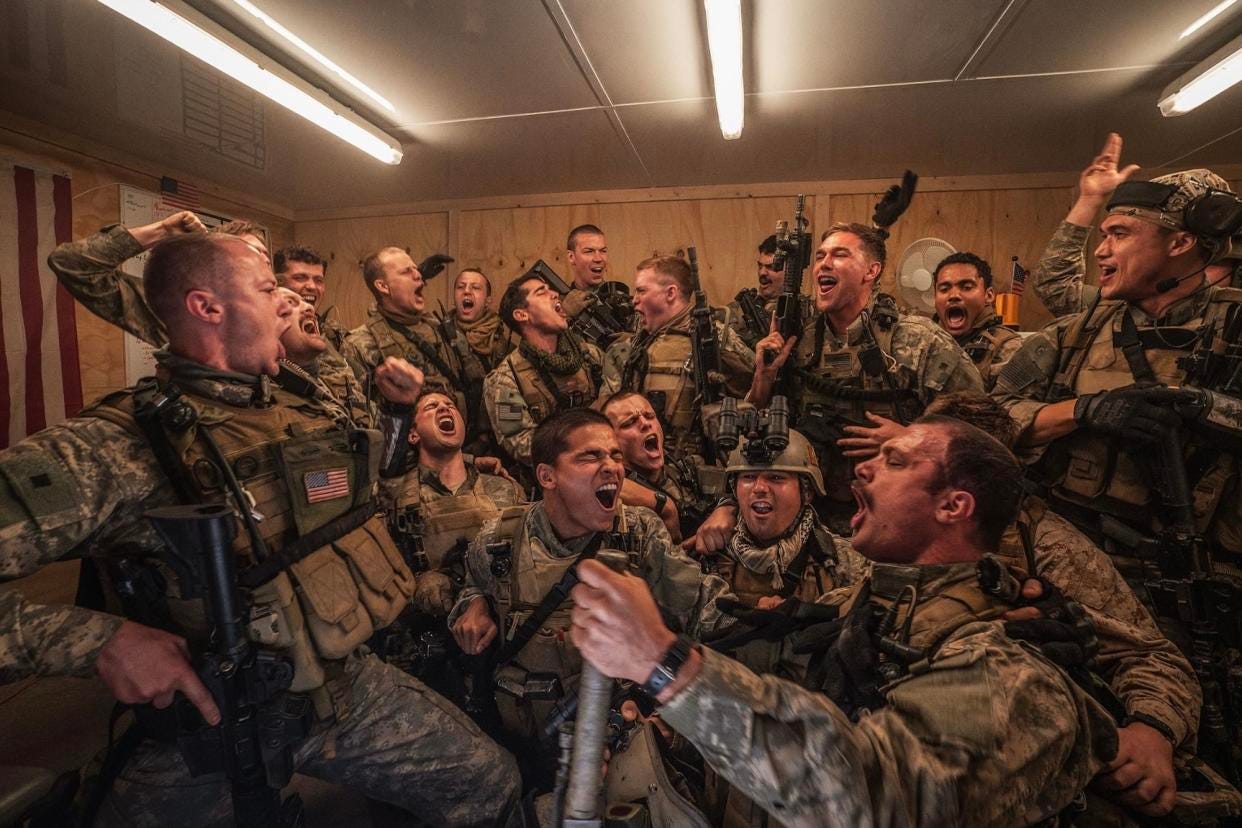
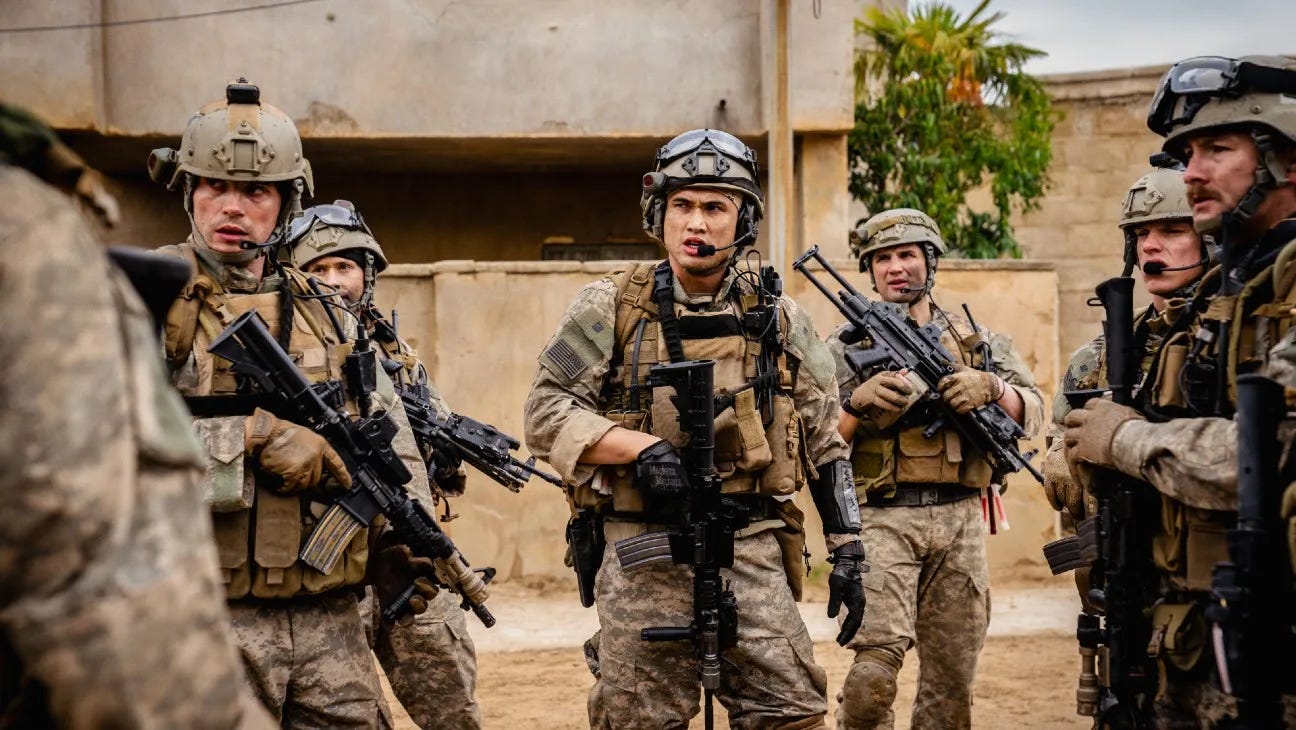
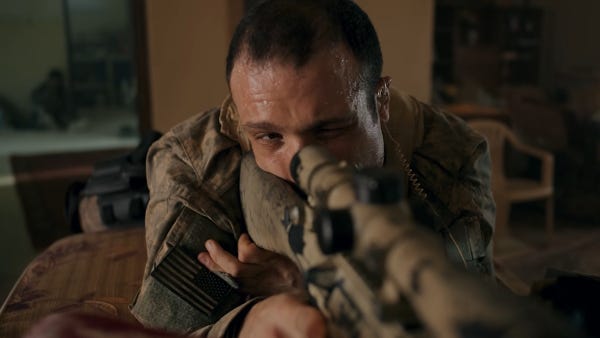
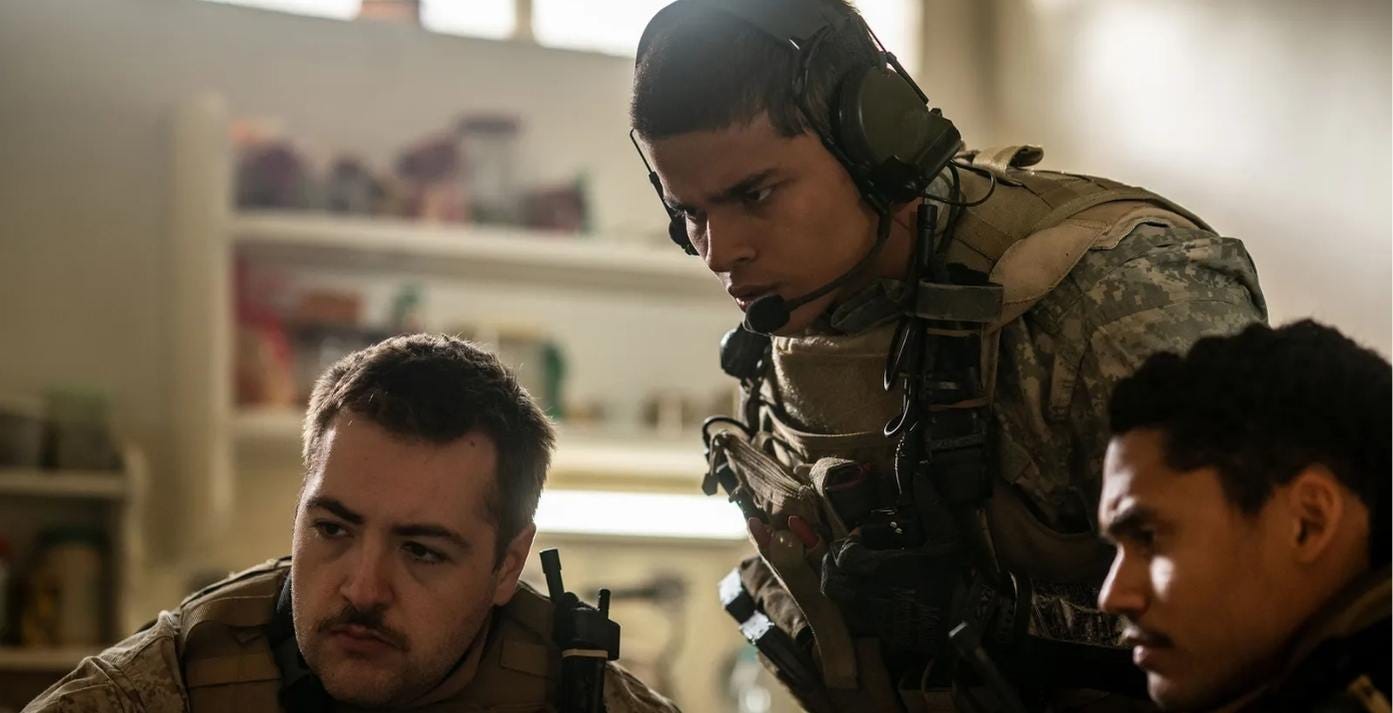
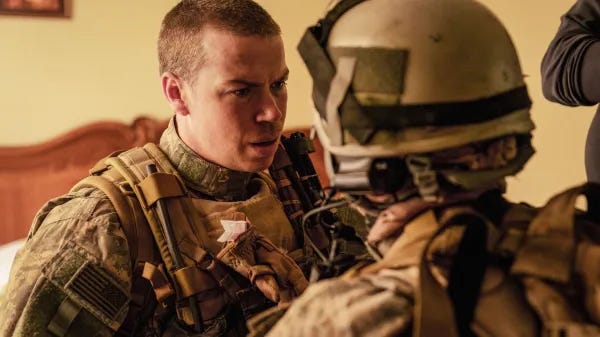
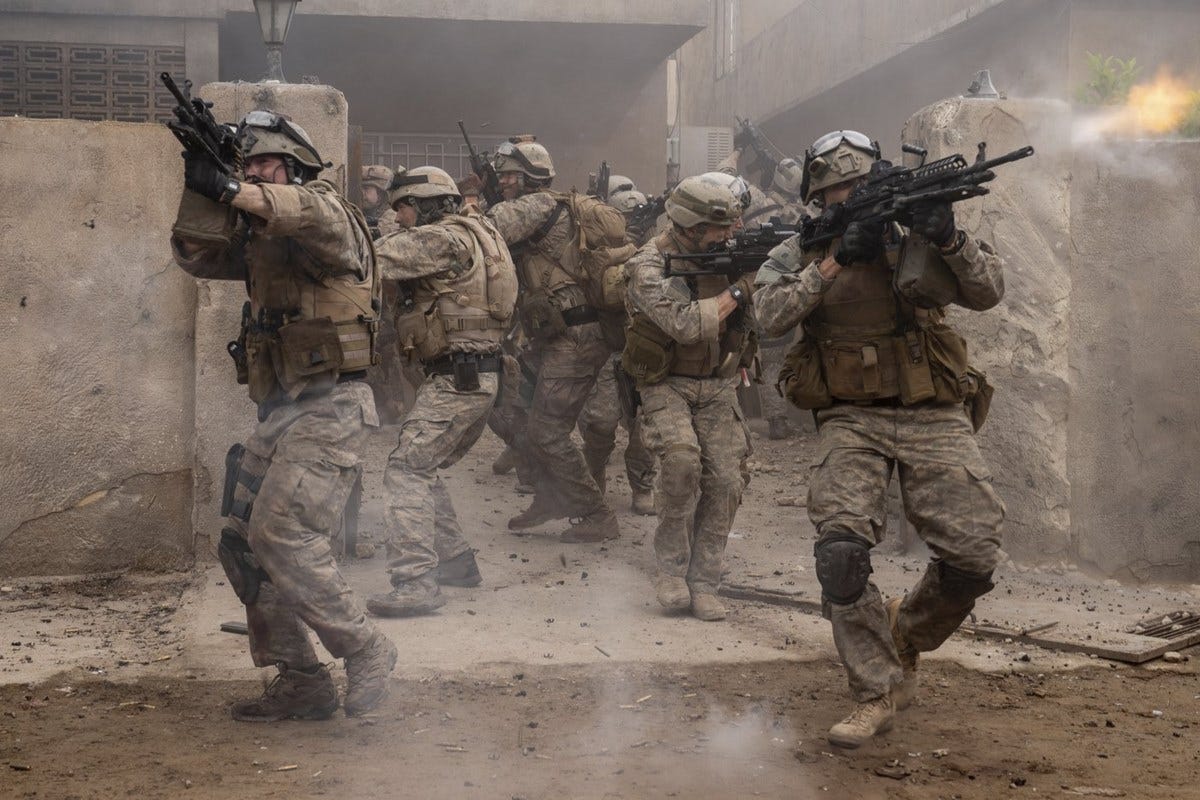
Interesting. I might see this.
“The rush of battle is often a potent and lethal addiction, for war is a drug.”
- Chris Hedges ("War Is a Force That Gives Us Meaning", 2002)
https://substack.com/profile/7708351-2serve4christ/note/c-107704849